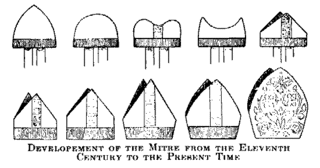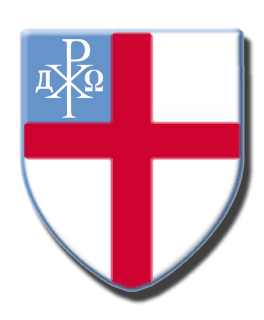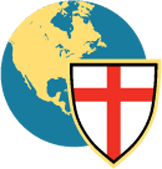
A bishop is an ordained clergy member who is entrusted with a position of authority and oversight in a religious institution.

An episcopal polity is a hierarchical form of church governance in which the chief local authorities are called bishops. It is the structure used by many of the major Christian Churches and denominations, such as the Catholic, Eastern Orthodox, Oriental Orthodox, Church of the East, Anglican, and Lutheran churches or denominations, and other churches founded independently from these lineages.

In many Christian denominations, an archbishop is a bishop of higher rank or office. In some cases, such as the Lutheran Church of Sweden and the Church of England, the title is borne by the leader of the denomination. In others, such as the Roman Catholic Church, there are many archbishops who either have jurisdiction over an ecclesiastical province in addition to their own archdiocese, or are otherwise granted a titular archbishopric.

In Christian churches with episcopal polity, the rank of metropolitan bishop, or simply metropolitan, pertains to the diocesan bishop or archbishop of a metropolis.

The Continuing Anglican movement, also known as the Anglican Continuum, encompasses a number of Christian churches, principally based in North America, that have an Anglican identity and tradition but are not part of the Anglican Communion.
An ecclesiastical province is one of the basic forms of jurisdiction in Christian Churches with traditional hierarchical structure, including Western Christianity and Eastern Christianity. In general, an ecclesiastical province consists of several dioceses, one of them being the archdiocese, headed by a metropolitan bishop or archbishop who has ecclesiastical jurisdiction over all other bishops of the province.

The Coptic Orthodox pope, also known as the Bishop of Alexandria, is the leader of the Coptic Orthodox Church, with ancient Christian roots in Egypt. The current holder of this position is Pope Tawadros II, who was selected as the 118th pope on November 18, 2012.

The history of the Anglican Communion may be attributed mainly to the worldwide spread of British culture associated with the British Empire. Among other things the Church of England spread around the world and, gradually developing autonomy in each region of the world, became the communion as it exists today.

The Anglican Province of America (APA) is a Continuing Anglican church in the United States. The church was founded by former members of the Episcopal Church in the United States in order to follow what they consider to be a more truly Christian, Catholic, and Anglican tradition. It comprises two dioceses in the United States: Diocese of the Eastern United States (DEUS) and the Diocese of the Central and Western States (DCWS). The combined American dioceses total 50 congregations, with an estimated 4,000 members. Worldwide, the Church has an estimated 30,000 members.

The Anglican ministry is both the leadership and agency of Christian service in the Anglican Communion. "Ministry" commonly refers to the office of ordained clergy: the threefold order of bishops, priests and deacons. More accurately, Anglican ministry includes many laypeople who devote themselves to the ministry of the church, either individually or in lower/assisting offices such as lector, acolyte, sub-deacon, Eucharistic minister, cantor, musicians, parish secretary or assistant, warden, vestry member, etc. Ultimately, all baptized members of the church are considered to partake in the ministry of the Body of Christ.
The Anglican Episcopal Church (AEC) was a Continuing Anglican church consisting of parishes in Arizona, Alaska, and Florida served by a presiding bishop and several other clergy. The AEC was founded at St. George's Anglican Church in Ventura, California.

Eritrea as a country and the Eritrean community are multi-religious; Eritrea has two dominant religions: Christianity and Islam, with most estimates placing the Christian share of the population at approximately 60%. Eritrean Christians are primarily followers of Oriental Orthodoxy, with a much smaller segment following Roman Catholicism-Eritrean Catholicism, and less than one percent of the population following P'ent'ay Evangelicalism.
James Parker Dees was the founder and first bishop of the Orthodox Anglican Church and the Orthodox Anglican Communion. Dees was born in Greenville, North Carolina on December 30, 1915, the son of James Earle Dees and Margaret Burgwin (Parker) Dees. He graduated in 1938 from the University of North Carolina at Chapel Hill with a Bachelor of Arts (BA) degree in political science and economics, then took a year of graduate study in international relations. From 1939 until 1942, he worked for the Atlantic Coast Line Railroad in Greenville, North Carolina. For two years after the Second World War, he was a baritone soloist with the New York Opera Company. He then studied at the Protestant Episcopal Church’s Virginia Theological Seminary for his Bachelor of Divinity degree, graduating in 1949. He was ordained as a deacon in the Episcopal Church on June 29, 1949; and as a priest by Thomas Henry Wright, Bishop of East Carolina, at the Church of the Holy Cross, in Aurora, North Carolina, on January 19, 1950. As a member of the Diocese of North Carolina, he served in charges in Aurora, Beaufort, and Statesville. His concerns about advancing liberalism caused him to withdraw from the denomination in 1963. Dees was discouraged from joining the Reformed Episcopal Church by fundamentalist leader Carl McIntire because of the REC's alleged association with groups perceived as being neo-evangelical. The decision to form a new jurisdiction was made. Dees founded the Anglican Orthodox Church on November 17, 1963 - the first religious body to withdraw from the PECUSA in the modern era. On Passion Sunday, March 15, 1964 Dees was consecrated a bishop by Wasyl Sawyna of the Holy Ukrainian Autocephalic Orthodox Church of North and South America, assisted by Orlando Jacques Woodward, a bishop of Old Catholic succession.

The historic or historical episcopate comprises all episcopates, that is, it is the collective body of all the bishops of a church who are in valid apostolic succession. This succession is transmitted from each bishop to their successors by the rite of Holy Orders. It is sometimes subject of episcopal genealogy.

Anglican interest in ecumenical dialogue can be traced back to the time of the Reformation and dialogues with both Orthodox and Lutheran churches in the sixteenth century. In the nineteenth century, with the rise of the Oxford Movement, there arose greater concern for reunion of the churches of "Catholic confession". This desire to work towards full communion with other denominations led to the development of the Chicago-Lambeth Quadrilateral, approved by the Third Lambeth Conference of 1888. The four points were stipulated as the basis for church unity, "a basis on which approach may be by God's blessing made towards Home Reunion":

The Anglican Church in North America (ACNA) is a Christian denomination in the Anglican tradition in the United States and Canada. It also includes ten congregations in Mexico, two mission churches in Guatemala, and a missionary diocese in Cuba. Headquartered in Ambridge, Pennsylvania, the church reported 30 dioceses and 1,037 congregations serving an estimated membership of 134,593 in 2017. In 2020, the denomination reported 972 congregations and 126,760 members. The first archbishop of the ACNA was Robert Duncan, who was succeeded by Foley Beach in 2014.
The Bartonville Agreement came from a meeting held in May 1999 by bishops representing both the Anglican Communion's American province and a number of Continuing Anglican jurisdictions in North America. As such, it was an early effort made by conservative Episcopal bishops and Continuing Anglican bishops to voice a common set of principles which might become the basis of future cooperation between their churches or dioceses. The schism that had divided these church bodies had occurred in 1977 at the Congress of St. Louis when "Continuers" met and formed a new Anglican church in reaction to changes in doctrine and practice that had been approved by The Episcopal Church and the Anglican Church of Canada.

Scott Earle McLaughlin was the Presiding Bishop of the Orthodox Anglican Church, Metropolitan Archbishop of the Orthodox Anglican Communion, and the Chancellor of Saint Andrew's Theological College and Seminary. On 1 May 1999 McLaughlin was consecrated as a bishop by Herbert M. Groce, Metropolitan Archbishop of the Anglican Rite Synod in the Americas, assisted by Bishop Larry Shaver of the Anglican Rite Synod in the Americas, and Bishop Robert J. Godfrey of the Orthodox Anglican Communion. His apostolic succession is Anglican, Old Catholic, and Orthodox. McLaughlin served as suffragan bishop until 30 April 2000, when Bishop Godfrey retired. He was then elected Presiding Bishop of the Orthodox Anglican Church and Metropolitan Archbishop of the Orthodox Anglican Communion. He was the fourth archbishop to lead the Orthodox Anglican Communion and the Orthodox Anglican Church. He is married with four children; two sons and two daughters.
T. Creighton Jones was the Presiding Bishop of the Orthodox Anglican Church and Metropolitan Archbishop of the Orthodox Anglican Communion. His apostolic succession is Anglican, Old Catholic, and Orthodox. He was the fifth archbishop to lead the Orthodox Anglican Communion and the Orthodox Anglican Church.

Thomas E. Gordon is the sixth Presiding Bishop of the Orthodox Anglican Church and Metropolitan Archbishop of the Orthodox Anglican Communion. On November 16, 2014, Creighton Jones announced his retirement and nominated Gordon, then his suffragan, to be his successor. Gordon became Metropolitan on April 18, 2015.












